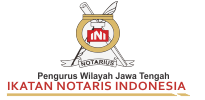The Urgency of Regulation of Data Protection for the Parties in Cyber Notary
Abstract
Notary is a public official authorized to make authentic deeds and have other authorities. In carrying out his duties and authority, the Notary must be able to maintain the confidentiality of every data of the parties in the deed he makes. parties in the deed he makes. The principle of confidentiality that has been regulated in UUJN Article 16 paragraph (1) letter f has the potential to clash with the concept of Cyber Notary, which has also been contained in notary concept which has also been contained in UUJN Article 15 paragraph (3) which in its explanation states explanation states that one of the other powers of Notary referred to is the authority to certify transactions conducted electronically (Cyber Notary). The authority of Notary in Cyber Notary has drawn pros and cons in various circles. various circles. The problem arises when in the implementation of Cyber Notary uses the services of third parties to build up to the maintenance of the Cyber Notary electronic system. Thus, there will be a third party. Thus, there will be a third party who can access all deeds in the system. This means that the data parties are no longer a secret of the notary and are no longer in accordance with the principle of confidentiality that requires the notary to in accordance with the principle of confidentiality that requires the Notary to maintain its confidentiality as it has been applied so far. This research will examine the implementation of the principle of Notary confidentiality and the urgency of regulating the protection of parties' data in Cyber Notary to prevent notaries from being sued in the future. This research uses a normative legal research method with a statue approach and conceptual approach. The results showed that the need for Cyber Notary must be in line with the regulation of data protection of the parties in the Cyber Notary because UUJN has provided rules that the Notary is obliged to keep confidential everything about the Deed he makes and all information obtained to protect the parties' data.
Keywords
Full Text:
PDFReferences
see the Original Version in Pdf
DOI: http://dx.doi.org/10.30659/akta.v11i3.39748
Refbacks
- There are currently no refbacks.
Copyright (c) 2024 JURNAL AKTA

This work is licensed under a Creative Commons Attribution-NonCommercial-NoDerivatives 4.0 International License.
Jurnal Akta has been indexed by:
Editorial Office: Jurnal Akta Room 2nd Floor Imam As Syafei Building Faculty of Law Universitas Islam Sultan Agung. Jln. Kaligawe KM. 4, Semarang City, Central Java, Indonesia. Phone +62 24 6583584 Fax +62 24 6582455
Email: jurnalakta@unissula.ac.id

![download[4]](https://jurnal.stiki-indonesia.ac.id/public/site/images/adminjurnal/template_jurnal_tosca1.png)














